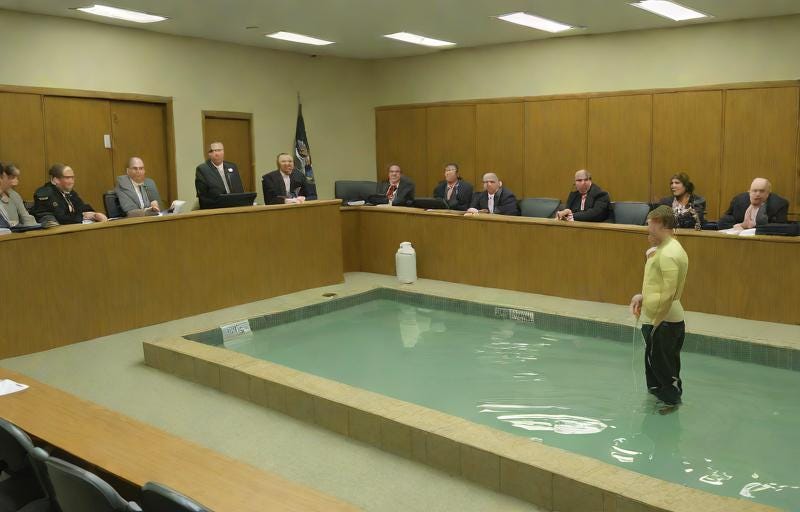Can we be honest here?
In his ruling on whether Fani Willis should be disqualified, Judge Scott McAfee acknowledged that Ms. Willis playing the race card at an historic black church was “legally improper”, but would not result in the defendants’ ability to have a fair trial. Can we be honest here? The judge has just aided the prosecution in the most egregious jury tampering exercise since the Jim Crow days. Ironic, isn’t it.
The question I would ask is “how would accusing all of the defendants — and their attorneys — of racism where a jury pool that will be nearly 100% black and 100% Democrat not prevent empaneling a fair and impartial jury?” Many commentators, including myself have tried to unravel McAfee’s motive for his ruling. Some have speculated that his upcoming election is at stake now that the Democrats have fielded an opponent. Job security. That is not likely his motive. A Republican appointed to fill a vacancy, McAfee must now “earn” his bench. However, by mustering the courage to get to a just and obvious ruling, he would find himself in good standing to get an appointment to a circuit court or some other high profile position in the next Republican administration. Not to mention book deals, movie rights, etc. Instead, he seemed to wee in the jury pool, both by justifying Willis and Wade’s behavior, perjury and in the case of Willis herself, jury tampering.
The judge could not be ignorant of the racial dynamic in Fulton County. In a case where finding a jury that does not already hate the primary defendant in what will be an ugly election season is all but impossible, tossing out charges of racism is Ms. Willis’ insurance policy. One can guarantee that Trump will be convicted, even if the outcome is reversed on appeal. If I were Trump’s campaign advisor, I’d suggest he work with the same conservative black leaders he spoke with a few weeks ago to craft a policy agenda for our decaying cities, including Atlanta. He could then take his case to these communities in hopes of influencing opinion for the election, and potentially manage to get at least one objective juror.
How Ms. Willis Saved Her Fanny
If a race hustler can toss out the race card and make the accusation stick, they can get their way in virtually any contest or dispute. But racial politics dirties up more than just the target (Trump and his codefendants… and their legal teams). Virtually any white person connected with the case can be collateral damage. In the case of the judge, his reputation and future opportunities would evaporate if he made a ruling favorable to the defendants. The damage would be multiplied if his ruling resulted in the case being dismissed or transferred to another county where a fair trial would at least be possible.
Ms. Willis, while lacking judgement and temperament to do a credible job as DA is not as dumb as her appearance in the hearings or her “church speech” made her look. The reality is she knew exactly who the target was — or at least who the people in the church and in the community at large would assume it was — Judge McAfee himself. If the defendants and their lawyers are presumed to be racist because they’re white and disagree with Willis’ ethics (or lack of ethics), it’s only reasonable that the white judge who rules favorably on their motions to disqualify the District Attorney and dismiss the case is an even bigger racist.
The Race Card Should be Burned
This case is yet more anecdotal evidence that unfounded charges of racism are just as damaging to our justice system as the Jim Crow era “justice” system that made a fair trial nearly impossible for black defendants; it is a card that should be pulled from the deck and burned. But how can that be accomplished in the charged and divided climate in which we find ourselves? Perhaps laws that required the immediate dismissal of all charges when a prosecutor accuses the defendant of being a racist would be a start. Unless the charge specifically relates to a bias crime, race should never be discussed in the courtroom. Likewise, any prosecutor who makes such charges outside the courtroom should be immediately removed from active service and face a bar review.
What about defendants who make such claims? If the claim is made in a proper motion and it is based on the actions of a prosecutor or the court, he would be fine. Otherwise, there should be a similar sanction for the defendant, so long as his constitutional rights are not violated.
In all cases where a person publicly charges another individual is a racist, it should be grounds for a special category of compensable slander or defamation. The person should be given 30 days to provide documentary evidence of the charge or face judgment and assignment of damages. My sense of outrage cries out that calling someone a racist without evidence should be considered a punishable hate crime. Unfortunately, I don’t even believe in hate crimes, so such a demand would be self defeating. But at least I wouldn’t be relieving myself in someone else’s jury pool.



